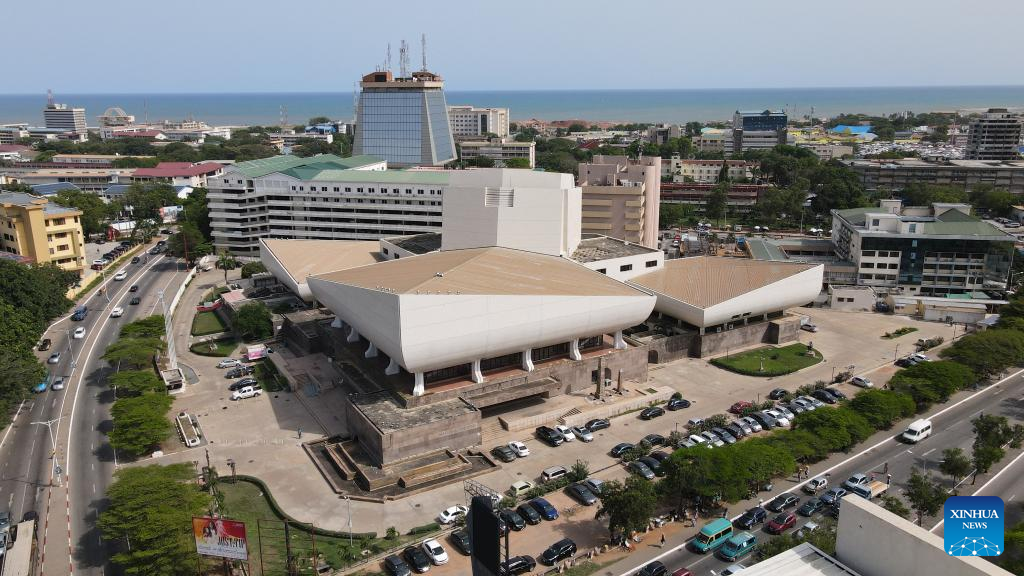
The National Theater of Ghana is a landmark architecture project funded by China in Accra, Ghana. March 30, 2023. [Photo/Xinhua]
By Kodjo Adams
China's quest to ensure long-term development prompted the idea of the Belt and Road Initiative (BRI) to connect the world, including Africa, through infrastructure projects.
The initiative specifies five key priorities: policy cooperation, infrastructure interconnection, unhindered trade, financial integration and people-to-people connections. It is worth commending China on its ingenuity to propose such a good initiative to bring infrastructure development to Ghana and beyond.
Ghana's Parliament in 2018 approved a $2 billion Master Project Support Agreement (MPSA) between Ghana and Sinohydro Corporation Limited of China for the construction of priority infrastructure projects. The MPSA is essentially a barter facility under which Sinohydro will implement various contracts for Ghana and the state will repay with refined bauxite.
The collaboration between the two countries underscores the importance of effective road infrastructure for rapid socio-economic development in Ghana. This is critical because access to an efficient road network in Ghana would facilitate a good transportation system and help reduce travel time.
In 2017, the Ghanaian government launched its 10-point pillars of the industrial transformation agenda to boost socio-economic development. Some of the items on the agenda include a district, one factory, industrial parks and special economic zones, enhanced domestic retail infrastructure, and the development of small and medium enterprises, among others.
It is important for Ghana to take advantage of the BRI to meet its targeted objectives, especially with a focus on industrial parks and economic zones, which aim to facilitate the acquisition of land for industrial parks within the free zone enclaves to access reliable energy supply. This agenda can be realized with reliable and strong technological support from China, the pacesetter of infrastructure development.
Ghana's one district, one factory policy could be effective with good technological infrastructure to boost local production and beyond.
For instance, the BRI would enable China's investment in terms of technological machines like tractors and heavy equipment to help farmers increase their production for expansion and export. This is important because some of the farmers in rural areas use or resort to the traditional way of farming, which makes it difficult to produce enough to feed the population. This trend has led to a situation where Ghana imports most of its food and other essential materials and exports less.
The effective implementation of Ghana's policy of industrialization would create job opportunities and reduce the unemployment rate in the country. It will be in the best interest of Ghana authorities to fully implement the BRI to achieve the objectives of the policy.
The transportation systems in Ghana are unable to support businesses. For example, farmers find it hard to ship their produce to other regions. Over the years, these farmers have been complaining of promises from the authorities to fix the transportation system to solve these challenges, but to no avail. Some of the Ghanaian farmers in the rural areas produce food but are not able to transport it to the cities due to poor road connections, and farmers who are able to transport their food items to the cities have experienced losses because some of the produce rotted.
All these challenges could be addressed if there were an effective road system, and the BRI would be the best way to achieve this.
To force authorities to implement their political promises, some of the local people embarked on demonstrations to express their concerns about the government's response. For instance, in Ghana, during a bye-election in Kumawu in the Ashanti region and Assin North in the Central region, the authorities were forced to start the construction of roads in the regions as a way to garner people's votes.
Infrastructure development has been a bane in Africa, and it is imperative for leaders to prioritize development projects for sustainable growth. A country like China has developed because of its focus on infrastructure development, and it is important for other countries, including Ghana, to tap into the experience of China's model of development projects.
Ghana must make good use of the BRI for greater opportunities. It is my expectation that the implementation of the initiative will change Ghana's infrastructure architecture and lead to prosperity in many aspects of the economy.
Kodjo Adams, a special commentator on current affairs for CGTN, is a journalist for the Ghana News Agency.

 中文
中文



